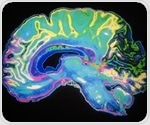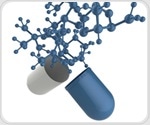| |  A protein made by stressed cancer cells helps lung and pancreatic tumors evade the immune system, a new study shows. A protein made by stressed cancer cells helps lung and pancreatic tumors evade the immune system, a new study shows. | |
|
| |  This systematic review in Nutrients evaluates human studies investigating whether polyphenol-rich berry consumption can modulate obesity-related metabolic dysfunction and support cognitive performance, particularly in individuals at risk of mild cognitive impairment. Evidence suggests modest memory benefits and possible metabolic improvements, although biomarker findings and long-term clinical relevance remain uncertain. This systematic review in Nutrients evaluates human studies investigating whether polyphenol-rich berry consumption can modulate obesity-related metabolic dysfunction and support cognitive performance, particularly in individuals at risk of mild cognitive impairment. Evidence suggests modest memory benefits and possible metabolic improvements, although biomarker findings and long-term clinical relevance remain uncertain. | |
|
| |  Plasma brain-derived tau is emerging as a sensitive biomarker for Alzheimer’s disease and acute neurological disorders, supporting earlier detection. Plasma brain-derived tau is emerging as a sensitive biomarker for Alzheimer’s disease and acute neurological disorders, supporting earlier detection. | |
|
| |  A new UCLA investigator-initiated study sponsored by the UCLA Health Jonsson Comprehensive Cancer Center has found that adding immunotherapy to standard chemotherapy before surgery is safe and shows promise for some patients with borderline-resectable pancreatic cancer, a disease that has historically been difficult to treat. A new UCLA investigator-initiated study sponsored by the UCLA Health Jonsson Comprehensive Cancer Center has found that adding immunotherapy to standard chemotherapy before surgery is safe and shows promise for some patients with borderline-resectable pancreatic cancer, a disease that has historically been difficult to treat. | |
|
| |  The search for effective and accessible therapies for diabetes continues to draw attention to medicinal plants with a long history of traditional use. The search for effective and accessible therapies for diabetes continues to draw attention to medicinal plants with a long history of traditional use. | |
|
| | Menopausal hormone therapy (commonly known as hormone replacement therapy or HRT) is not associated with an increased risk of death, finds a Danish study of over 800,000 women published by The BMJ today. | |
|
| |  Higher intake of ultra-processed foods in adults with obesity was associated with disordered eating symptoms, poorer diet quality, and lower protein intake. The cross-sectional findings suggest dietary processing level may influence eating behaviour patterns relevant to obesity management, though causality cannot be inferred. Higher intake of ultra-processed foods in adults with obesity was associated with disordered eating symptoms, poorer diet quality, and lower protein intake. The cross-sectional findings suggest dietary processing level may influence eating behaviour patterns relevant to obesity management, though causality cannot be inferred. | |
|
| |  In Switzerland, 0.02% of the population lives beyond the age of 100. In Switzerland, 0.02% of the population lives beyond the age of 100. | |
|
| |  A new electronic implant system can help lab‑grown pancreatic cells mature and function properly, potentially providing a basis for novel, cell-based therapies for diabetes. A new electronic implant system can help lab‑grown pancreatic cells mature and function properly, potentially providing a basis for novel, cell-based therapies for diabetes. | |
|
| |  Immunoprecipitation-enhanced blood-based biomarkers are improving early diagnosis of Alzheimer’s disease by enabling more sensitive detection. Immunoprecipitation-enhanced blood-based biomarkers are improving early diagnosis of Alzheimer’s disease by enabling more sensitive detection. | |
|
| |  The brain does not only communicate through fast electrical impulses; it also relies on slower, more diffuse chemical signals that modulate our emotional and social states over time. The brain does not only communicate through fast electrical impulses; it also relies on slower, more diffuse chemical signals that modulate our emotional and social states over time. | |
|
| | Chronic pain lasts longer for women than men, and new research suggests differences in hormone-regulated immune cells, called monocytes, may help explain why. | |
|
| |  A new scientific review highlights a growing environmental challenge linked to modern food production. Researchers report that waste from livestock and aquaculture operations now contains a complex mix of emerging contaminants that can spread through ecosystems and ultimately affect human health. A new scientific review highlights a growing environmental challenge linked to modern food production. Researchers report that waste from livestock and aquaculture operations now contains a complex mix of emerging contaminants that can spread through ecosystems and ultimately affect human health. | |
|
| |  Discover how protein, fiber, carbohydrates, and fats biologically shape hunger and fullness through measurable changes in gut hormones and central appetite circuits. Discover how protein, fiber, carbohydrates, and fats biologically shape hunger and fullness through measurable changes in gut hormones and central appetite circuits. | |
|
| |  Not all fiber works the same. Discover how viscosity, fermentation, and microbiome diversity determine whether dietary fiber truly improves metabolic health. Not all fiber works the same. Discover how viscosity, fermentation, and microbiome diversity determine whether dietary fiber truly improves metabolic health. | |